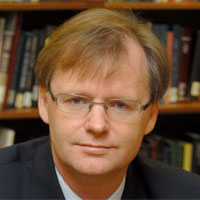Conférence du Professeur Michael Organ (York)

Titre : Catalysts: Making Them Do What You Want Them To Do and How You Do That.
La conférence sera prononcée par le professeur Michael Organ du Département de chimie de York University. Elle sera donnée en anglais.
Résumé : The Pd N-Heterocyclic carbene (NHC)-based pre-catalyst based on bis N,N-(2,6-diisopropylphenyl) imidazolium (Pd PEPPSI-iPr) has shown to be nicely reactive in a wide variety of cross-coupling procedures. The catalyst has been examined in Suzuki-Miyaura, Negishi, and Kumada-Tamao-Corriu couplings where it has shown very good reactivity. Within all of these families of reactions, couplings involving sp, sp2 and sp3centers have been examined and all possible combinations yield good to excellent conversions. In an attempt to gain understanding on the reactivity of NHC-based catalysts, an aggressive mechanistic study has been undertaken comprised of NMR spectroscopy, computational methods, and rate studies. Clearly the size of the groups on the flanking N-phenyl substituents plays a key role in the reactivity of the Pd-NHC complex. Attempts have been made to construct a catalytic cycle for Pd-NHC complexes and to subsequently dissect it to see where sterics and/or electronics exert their greatest effects. This physical and structural analysis has led to the rational creation of the second generation NHC catalyst based on bis N,N-(2,6-di(3-pentyl)phenyl) imidazolium, i.e., Pd PEPPSI-iPent. This catalyst has been further examined in catalyzed amination and sulfination, in addition to the carbon-carbon cross-coupling of intensively hindered and electronically-deactivated substrates, where it has demonstrated the highest levels of performance under the mildest conditions reported in these fields.
Emplacement : Université de Montréal - Pavillon Roger-Gaudry